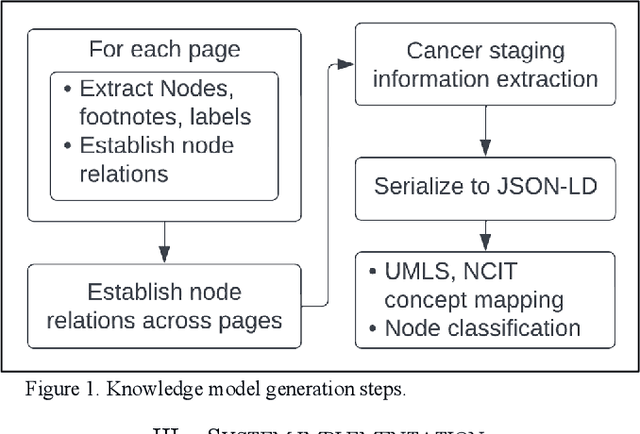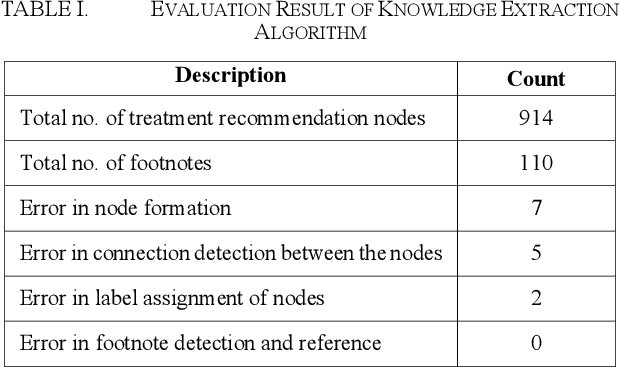Bhumika Gupta
Knowledge Models for Cancer Clinical Practice Guidelines : Construction, Management and Usage in Question Answering
Jul 23, 2024Abstract:An automated knowledge modeling algorithm for Cancer Clinical Practice Guidelines (CPGs) extracts the knowledge contained in the CPG documents and transforms it into a programmatically interactable, easy-to-update structured model with minimal human intervention. The existing automated algorithms have minimal scope and cannot handle the varying complexity of the knowledge content in the CPGs for different cancer types. This work proposes an improved automated knowledge modeling algorithm to create knowledge models from the National Comprehensive Cancer Network (NCCN) CPGs in Oncology for different cancer types. The proposed algorithm has been evaluated with NCCN CPGs for four different cancer types. We also proposed an algorithm to compare the knowledge models for different versions of a guideline to discover the specific changes introduced in the treatment protocol of a new version. We created a question-answering (Q&A) framework with the guideline knowledge models as the augmented knowledge base to study our ability to query the knowledge models. We compiled a set of 32 question-answer pairs derived from two reliable data sources for the treatment of Non-Small Cell Lung Cancer (NSCLC) to evaluate the Q&A framework. The framework was evaluated against the question-answer pairs from one data source, and it can generate the answers with 54.5% accuracy from the treatment algorithm and 81.8% accuracy from the discussion part of the NCCN NSCLC guideline knowledge model.
Automated Knowledge Modeling for Cancer Clinical Practice Guidelines
Jul 15, 2023



Abstract:Clinical Practice Guidelines (CPGs) for cancer diseases evolve rapidly due to new evidence generated by active research. Currently, CPGs are primarily published in a document format that is ill-suited for managing this developing knowledge. A knowledge model of the guidelines document suitable for programmatic interaction is required. This work proposes an automated method for extraction of knowledge from National Comprehensive Cancer Network (NCCN) CPGs in Oncology and generating a structured model containing the retrieved knowledge. The proposed method was tested using two versions of NCCN Non-Small Cell Lung Cancer (NSCLC) CPG to demonstrate the effectiveness in faithful extraction and modeling of knowledge. Three enrichment strategies using Cancer staging information, Unified Medical Language System (UMLS) Metathesaurus & National Cancer Institute thesaurus (NCIt) concepts, and Node classification are also presented to enhance the model towards enabling programmatic traversal and querying of cancer care guidelines. The Node classification was performed using a Support Vector Machine (SVM) model, achieving a classification accuracy of 0.81 with 10-fold cross-validation.
 Add to Chrome
Add to Chrome Add to Firefox
Add to Firefox Add to Edge
Add to Edge